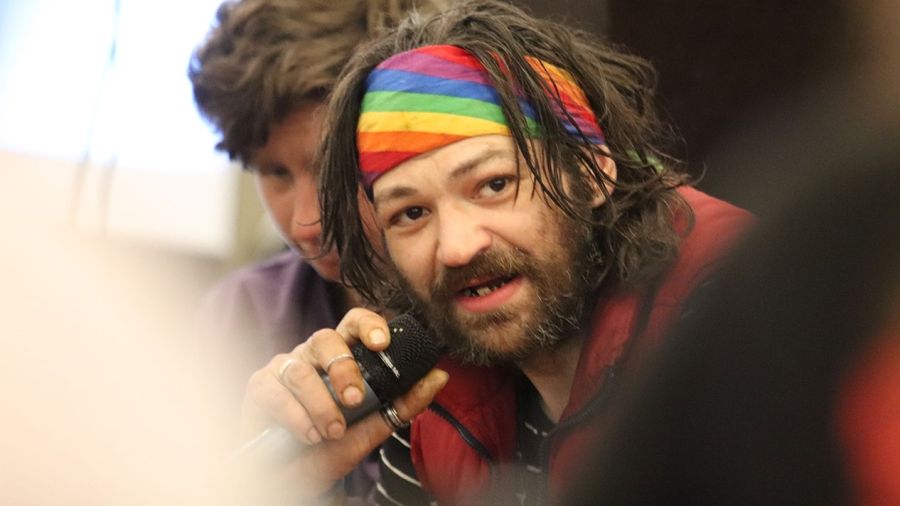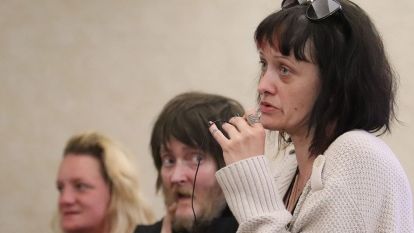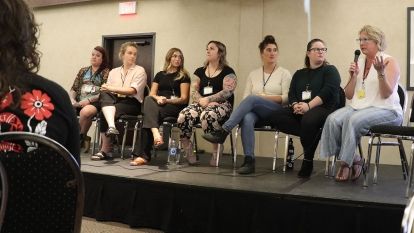
Safety, stigma and immense struggle were key themes brought forward by a panel of individuals with lived experience who presented at the West Kootenay Homelessness Response Summit held in mid-May.
As part of the three-year Bridging Rural Homelessness and Well-Being: A Sustainable and Collaborative Response project that is currently being led by a team at Selkirk Innovates, the summit brought together diverse perspectives and expertise from across the region for a one-day event held in Castlegar. The morning session featured 15 individuals from different communities in the region who spoke honestly about living on the street, substance use, service gaps, public perception and constant trauma.
“People who experience homelessness or housing precarity are highly aware that our systems are ineffective,” says Amber Streukens, ANKORS Street College Program Coordinator and consultant on the Selkirk Innovates project. “The silo-based approach makes it not work, there is harm that is caused within the structure. My hope is that eventual outcomes from this project will create an opportunity to fix some of the systemic, structural problems that fracture our services and relationships. We keep ending up in this conversation from town-to-town about why these people are here and what services are available. The reality is that we are a region, it needs to exist everywhere and all of our communities need to be working together.”
Research Aimed at Better Decision Making
Funded through the Social Sciences & Humanities Research Council of Canada and Mitacs, with cash and in-kind contributions from community partners, the social innovation project began in the fall of 2022. Selkirk Innovates—the research arm of Selkirk College—is working on the goal of improving the well-being of rural residents experiencing or at risk of homelessness in West Kootenay communities by providing evidence-based research to assist with decision making.
Still in the early phase of the project, the summit helped set the stage for regional collaboration over the coming years by bringing together 140 participants from social service agencies, health care providers, municipal government, Selkirk College students, business owners and those with lived experience.
Taking the stage as a group for almost an hour, individuals on the lived experience panel shared background stories and insight into their current situation. Many described a constant feeling being unsafe and a daily existence of instability. From suffering physical abuse and theft of personal items to aggressive vigilantism and stigmatization by those in the greater community, the daily plight carries a steady sense of hopelessness. For most on the panel, substance use support and access to housing was at the core.
“I’m an addict, that’s not why I’m homeless… it’s because there is no place to live,” said one participant.
Bringing experiential and professional insight, Streukens has been an essential member of the project team, consulting about upcoming research and facilitating some of the data gathering through relationships she has built in her role at ANKORS. Finding participants willing to tell their story at the summit was not difficult, but creating equitable and accessible opportunities can be challenging.
“The depth of the struggle is very hard to plan around,” says Streukens. “I don’t know if the person who we have prepared and wants to speak is going to get kicked out the shelter the night before or have all of their stuff stolen or overdose or not be able to find their meds and get sick. We didn’t know who was going to be on the panel and what they were going to talk about, we just focused our energy on supporting people to be there and be comfortable being there.”
Important Step in Moving Forward
The courage to tell their stories to the room was appreciated by those in attendance. Though optimism can be hard to uphold when faced with persistent systematic issues, Streukens says many of those who participated were hopeful that listening to human stories will translate into better leadership on the issue of homelessness and substance use. Many on the panel received resounding positive feedback and felt encouraged that their voices had an impact.
“There was a lot anxiety in that room about being that voice because none of us represent all of us,” she says. “People are always the expert of their own experience. When it is the dominant discourse or academia or the medical system or the government, the powers-that-be most often can’t hear the expertise or make space for it. If you can’t acknowledge and treat it as a worthy contribution, policy will always fail.”
The work done at the summit by all participants will now help move the project along to the next stage. Selkirk Innovates continues to build research that will ultimately provide organizations and communities with lessons that will help avoid duplication and make the best use of resources as conditions evolve.
“The summit helped build an understanding of what is already happening in the region and where needs are,” says Jayme Jones, the Selkirk Innovates researcher heading up the project. “Ten project ideas where developed with first steps and lead organizations identified. The Selkirk College team will share these projects with partners and will determine how college resources can support turning these ideas into actions.”
Find out more about the Bridging Rural Homelessness and Well-Being: A Sustainable and Collaborative Response project here.
Learn more about Selkirk Innovates.
Sustainable Development Goal (SDG) #1: End poverty in all its forms everywhere
Sustainable Development Goal (SDG) #11: Make cities and human settlements inclusive, safe, resilient and sustainable




